views
In an era marked by rapid geopolitical changes and economic uncertainties, the AIM Summit Dubai emerged as a pivotal platform for global leaders to discuss pressing international issues. Among the distinguished speakers were Boris Johnson, former Prime Minister of the UK, and David Gibson-Moore, President and CEO of Gulf Analytica. Their insights provided a comprehensive overview of the complexities facing global leaders today.
Boris Johnson's Global Leadership Insights
Drawing from his tenure as Prime Minister, Boris Johnson shared his experiences in leading through crises, including Brexit and the COVID-19 pandemic. He emphasized the significance of decisive leadership and the ability to unite diverse stakeholders toward common goals. Johnson highlighted the importance of adaptability and foresight in addressing the dynamic nature of the global geopolitical landscape.
David Gibson-Moore's Perspective on Global Shifts
David Gibson-Moore provided a nuanced analysis of the global economic shifts and geopolitical challenges shaping today's world. His perspectives offered a deep dive into the complexities of international relations and economic strategies. Gibson-Moore emphasized the interconnectedness of economic policies and geopolitical dynamics, underscoring the need for strategic collaboration and adaptive leadership.
Geopolitical Challenges in the Middle East
A core theme in the discussion was the geopolitical challenges in the Middle East, where conflict zones, energy politics, and shifting alliances have shaped decades of tension. David Gibson-Moore elaborated on how fragile states, economic inequality, and regional rivalries continue to impact global oil markets and security frameworks. Boris Johnson added that resolution must come through economic inclusion and sustainable governance, emphasizing the need for multilateral cooperation and strategic investments to support long-term stability.
Global Security and NATO Post-Ukraine War
The global security and NATO post-Ukraine war discussion was among the most urgent topics on the table. Johnson expressed concern over Europe's vulnerability in the face of an aggressive Russia and questioned NATO's preparedness to manage prolonged conflict in Eastern Europe. However, he remained optimistic, arguing that unity among Western democracies has never been stronger. The AIM Summit Dubai roundtable addressed how this new security alignment is reshaping defense budgets, foreign aid, and diplomatic engagement, especially in bordering nations.
Global Britain Vision Post-Brexit
Perhaps one of the most debated segments was Johnson’s elaboration on the Global Britain vision post-Brexit. Far from a nostalgic look at empire, Johnson emphasized agility, innovation, and partnerships. He championed the UK's accession to the Comprehensive and Progressive Agreement for Trans-Pacific Partnership (CPTPP) and deeper relations with Commonwealth countries and tech powerhouses like India. The UK's foreign policy and multilateral organizations approach, he argued, must now focus on flexible trade, security cooperation, and thought leadership in climate action.
UK's Foreign Policy and Multilateral Organizations
The session on UK's foreign policy and multilateral organizations emphasized a departure from legacy diplomacy. Johnson highlighted how the UK's involvement in the UN, NATO, and G7 must evolve in a world where power is more fragmented. Meanwhile, David Gibson-Moore stressed the importance of financial institutions such as the IMF and World Bank adapting to new global priorities: sustainability, digital infrastructure, and inclusive growth. They both agreed that a collaborative approach is required to maintain peace and encourage global economic development.
Global Geopolitical Landscape and Future Trends
Analyzing the global geopolitical landscape and future trends, Johnson warned against complacency. He sees a world where non-state actors, cyber threats, and information warfare are as disruptive as conventional conflicts. Governments must invest not just in weapons but also in education, innovation, and media literacy. David Gibson-Moore added a cautionary note on debt sustainability, especially in developing economies, and how financial volatility is becoming the norm. The leaders agreed that the next decade will be defined by resilience, adaptation, and regional leadership rather than dominance by a few superpowers.
Conclusion
The AIM Summit Dubai roundtable with David Gibson-Moore and Boris Johnson was more than a geopolitical debrief—it was a masterclass in adaptive leadership, strategic foresight, and collaborative diplomacy. Their vision for the global geopolitical landscape and future trends merges realism with optimism, offering policymakers, investors, and citizens alike a roadmap for the uncertain road ahead. As the world moves from crisis to complexity, insights from such forums are essential in shaping a more stable, equitable, and innovative global order.














Comments
0 comment